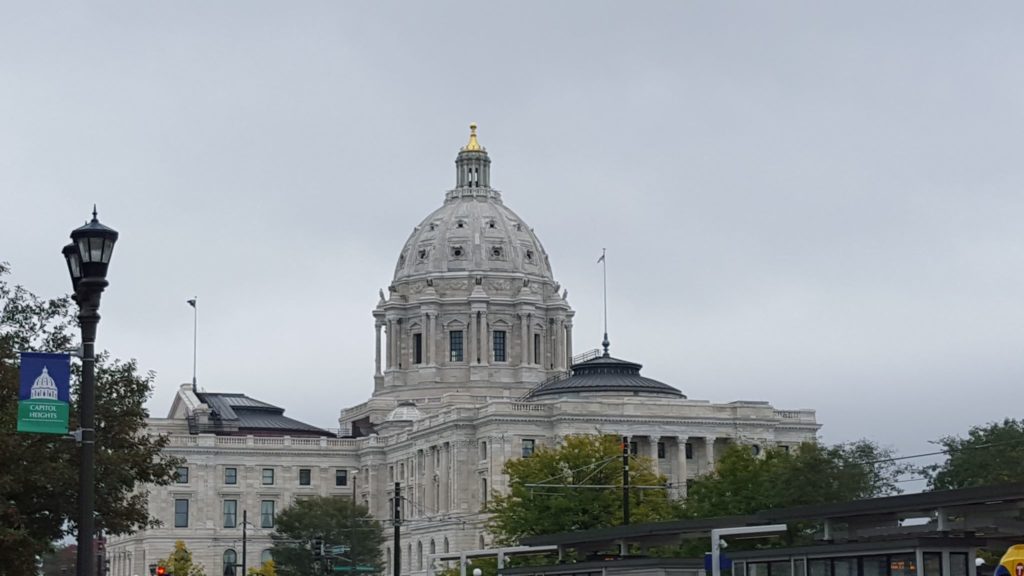
Matt Doll, Minnesota Environmental Partnership
Minnesota’s 2022 Legislative Session reached its constitutional deadline after a frantic but ultimately unfruitful week of activity at the Capitol. From MEP’s perspective, more progress was left on the table than passed despite a record-high budget surplus, but a few bright spots on MEP priorities did make it through the gridlock, and a special session may follow to get more done. (For more, see MEP’s Legislative wrap-up)
What passed
Of major importance to MEP and our members this session was the Agriculture Omnibus bill. MEP spoke out in support of higher levels of funding proposed by the House of Representatives, but the final number was far closer to the lower level offered by the Senate. Despite this, MEP was pleased to see investments passed to support longtime priorities, namely the development of crops and practices that protect Minnesota’s lands and waters.
The Legislature passed additional funding for the University of Minnesota’s Forever Green Initiative, which works to develop crops that provide food and other products and generate farm income while also supporting soil health and water quality and helping to fight climate change. The bill also supports the development of supply chains for those crops so that they can achieve economic success and broaden their reach. Combined, those investments will total $1.26 million from 2024 to 2025.
The Agriculture bill also supports soil healthy farming practices, small farms and processing operations, and new and emerging farmers and related businesses. These farmers are often early adopters of sustainable land use and MEP is pleased to see them get support.
The Legislature also passed a bill to spend money from the funds created by Minnesota voters with the Clean Water, Land, and Legacy Constitutional Amendment. While it should be par for the course for the Legislature to pass investments from these voter-created sales tax funds, it’s still encouraging to see them make it through to approval. The Outdoor Heritage and Clean Water Fund dollars in particular will support numerous vital habitat, conservation, and clean water. MEP expressed concerns earlier in the session that the final Legacy bill wouldn’t respect the Clean Water Council’s role in directing funding and instead use Clean Water funds for unvetted projects, and we are pleased to see that the final bill aligns with our values.
Unfortunately, that’s not what happened with Minnesota’s other major dedicated environmental fund, the Environment and Natural Resources Trust Fund. While the Legislature did pass a bill to spend ENRTF dollars, mostly on worthy environmental projects, it contained funding for projects that have not been recommended by the Legislative-Citizen Commission on Minnesota Resources (LCCMR.) That may seem a technical point, but the LCCMR exists to make sure that the public has a clear role in how ENRTF dollars are spent. By bypassing the LCCMR and funding their own projects, the Legislature diminishes the public trust in this voter-created lottery fund and sets a bad precedent for future raids.
What didn’t pass
Compared with the productive investments of two years ago and the hopes that MEP had for this session at its beginning, the Legislature left a mountain of money on the table at a time when Minnesota’s climate, people, and natural resources need urgent investments.
The session reached its end with no energy and jobs bill, which could have funded investments in solar energy, electric vehicle infrastructure, and job training that would help put Minnesota on the path to a decarbonized economy. No environment bill, which had the chance to invest in natural landscapes and improved waste programs while setting policies that would rectify environmental injustices, protecting communities disproportionately harmed by pollution. And no state government finance and transportation bill, the failure of which will shortchange Minnesota’s public transit, making it harder to access federal funds.
On the other hand, policies that would have taken Minnesota backward – mostly proposed by the Senate – also failed to pass. These proposals included giveaways to the mining, plastics, and factory farming industries, restrictions on the public voice and open access to information, and a rule to prevent local communities from banning new natural gas connections.
The next chapter
Governor Walz and House and Senate leadership are currently discussing the possibility of a special session. Unlike in 2020, they won’t be automatically called back at a regular interval as there is no longer a legal state of peacetime emergency, so the Governor must call the two houses back once an agreement is reached.
MEP believes that Legislators should return to the Capitol to finish their work. We may not like all possible outcomes of the omnibus bills still on the table, but at this critical time, Minnesota needs investments in our lands, our infrastructure, and our communities in order to tackle the climate crisis. Leaving money on the table until next year is not a responsible option when every month matters to provide a livable future for Minnesotans.
For previous columns, visit mepartnership.org/category/blog/. If you would like to reblog or republish this column, you may do so for free – simply contact the author at matthew@mepartnership.org.